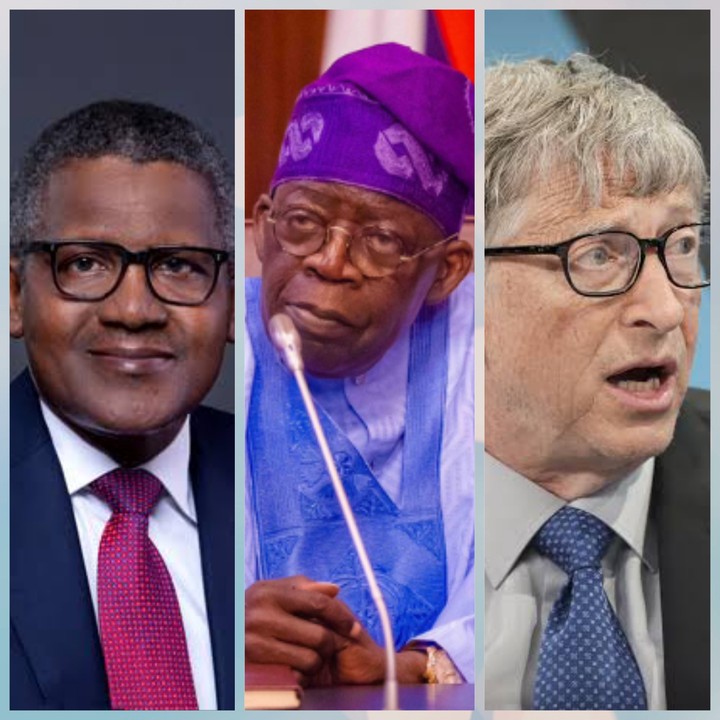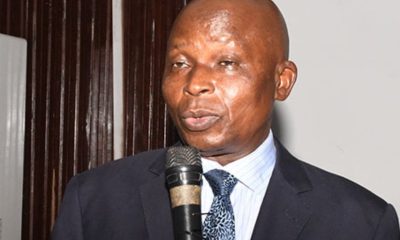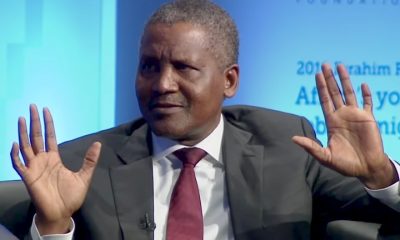Headline
Dangote, Bill Gates To Meet Tinubu On Monday

The Chairman of Dangote Group, Aliko Dangote, and Microsoft co-founder, Bill Gates, will on Monday meet President Bola Tinubu at the State House, Abuja.
Dangote disclosed this after a closed-door session with Tinubu at the Aso Rock Presidential Vila on Friday.
“I did not come to do much. I only came to inform the President about our visit with Microsoft co-founder and my friend Bill Gates. We will both see the President on Monday when we come together,” he told State House correspondents.
Although Dangote did not reveal the purpose of Monday’s visit, it is believed to be part of ongoing consultations Tinubu is having with key leaders within the local and global business community.
On June 8, The PUNCH reported that the President received Exxon Mobil Executives; Liam Mallon, Richard Laing and Mrs Adesua Dozie in a private meeting at the Villa.
In his inaugural speech on May 29, Tinubu promised local and foreign investors that he will “review all their complaints about multiple taxation and various anti-investment inhibitions.”
“We shall ensure that investors and foreign businesses repatriate their hard-earned dividends and profits home,” he added.
The President also promised to pursue industrial policies that will “utilise the full range of fiscal measures to promote domestic manufacturing and lessen import dependency.”
While targeting a higher GDP growth and lower unemployment rates, he said “We intend to accomplish this by taking the following steps; first, budgetary reform stimulating the economy without engendering inflation will be instituted.
“Second, industrial policy will utilise the full range of fiscal measures to promote domestic manufacturing and lessen import dependency. Third, electricity will become more accessible and affordable to businesses and homes alike.
“Power generation should nearly double and transmission and distribution networks improved. We will encourage states to develop local sources as well.”
Headline
Fagbemi warns against obstructing EFCC from performing its lawful duty

The Minister of Justice, Lateef Fagbemi, SAN has warned against obstructing the Economic and Financial Crimes Commission (EFCC) from carrying out its lawful duty .
Fagbemi’s warning is contained in a statement in Abuja.
“This is a matter of very grave concern, it is now beyond doubt that the EFCC is given power by the law to invite any person of interest to interact with them in the course of their investigations into any matter, regardless of status.
“Therefore, the least that we can all do when invited, is not to put any obstruction in the way of EFCC, but to honourably answer their invitation.
“A situation where public officials who are themselves subject of protection by law enforcement agents will set up a stratagem of obstruction to the civil and commendable efforts of the EFCC to perform its duty is to say the least, insufferably disquieting’’.
He added that running away from the law will not resolve issues at stake but only exacerbate them.
“Nigeria has a vibrant judicial system that is capable of protecting everyone who follows the rule of law in seeking protection.
“I therefore encourage anyone who has been invited by the EFCC or any other agency to immediately toe the path of decency and civility by honouring such invitation instead of embarking on a temporising self-help and escapism.
“This can only put our country in bad light before the rest of the world’’.
He said institutions of state should be allowed to function effectively and efficiently.
“I stand for the rule of law and will promptly call EFCC, and indeed any other agency to order when there is an indication of any transgressions of the fundamental rights of any Nigerian by any of the agencies’’.
NAN reports that the EFCC had on Wednesday warned members of the public that it was a criminal offence to obstruct officers of the Commission from carrying out their lawful duties.
Section 38(2)(a(b) of the EFCC Establishment Act makes it an offence to prevent officers of the Commission from carrying out their lawful duties. Culprits risk a jail term of not less than five years.
The warning , the EFCC said, became necessary against the background of the increasing tendency by persons and groups under investigation by the Commission to take the laws into their hands by recruiting thugs to obstruct lawful operations of the EFCC.
On several occasions, the anti graft agency said, operatives of the Commission have had to exercise utmost restraint in the face of such provocation to avoid a breakdown of law and order.
Headline
Unknown Gunmen Abduct Channelstv Reporter In Port-harcourt

Some unknown gunmen have kidnapped Joshua Rogers, the ChannelsTV reporter in Port-Harcourt, the Rivers State capital.
Politics Nigeria learnt that Rogers was picked up close to his residence at Rumuosi in Port Harcourt and to an unknown destination by the gunmen around 9pm on Thursday, April 11.
The reporter was driving his official ChannelsTV branded car when the hoodlums accosted, pointed a gun at him and took him away in the same vehicle.
Rogers was said to be returning from his official assignment in Government House after a trip to Andoni for a government event when the incident happened.
Already, the gunmen were said to have contacted his wife and demanded a N30million ransom for bis release.
His cameraman confirmed the incident and appealed to his abductors to set him free unconditionally.
-

 Business4 days ago
Business4 days agoSeplat Energy celebrates a decade of Dual Listing with Bell Ringing Ceremony at Nigerian Stock Exchange
-

 News4 days ago
News4 days agoBDCs now buying dollar at ₦980 — ABCON President
-

 Metro4 days ago
Metro4 days agoOsun Poly Student, Olanrewaju Olatona killed by hit-and-run one-way driver
-

 Headline4 days ago
Headline4 days agoFagbemi warns against obstructing EFCC from performing its lawful duty
-

 News4 days ago
News4 days agoLASG’s maize palliative impactful, says poultry association chair
-

 News4 days ago
News4 days agoWoman killed while crossing road in Anambra
















